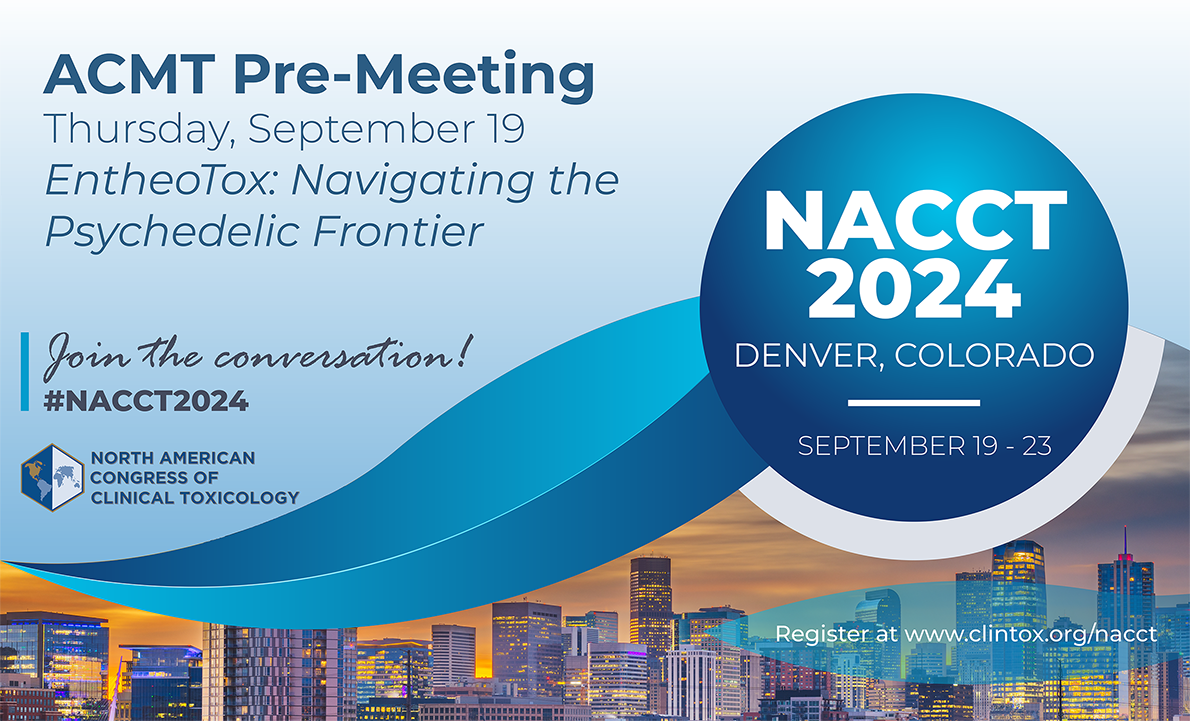
ACMT Activities at #NACCT2024
Important Dates
ACMT Pre-Symposium
Thurs. September 19
ACMT 25th Annual Clinical Pathological (CPC) Presentation Competition
Fri. September 20
Other ACMT Activities at #NACCT2024
Sun. September 22
FIT Visiting Professor Lecture
FIT Roundtable
ACMT Scientific Symposium
ACMT Practice Symposium
ACMT Activities at #NACCT2024
Join ACMT at the 2024 North American Congress of Clinical Toxicology (NACCT) in Denver, Colorado, from September 19-23, 2024.
In addition to the ACMT Pre-Meeting, EntheoTox: Navigating the Psychedelic Frontier Thursday, September 19th, ACMT will participate in a number of other activities and programming.
Other ACMT Activities
Friday, September 20 • 5:00 PM – 7:00 PM
ACMT 25th Annual Clinical Pathological (CPC) Presentation Competition
Sunday, Sept. 22 • 10:00 AM – 11:00 AM
FIT Visiting Professor Lecture | Decoding Research Funding Opportunities: How to Select, Read, Write a Grant to Get Yourself Funded
- Peter R Chai, MD MMS, FACMT, Assistant Professor, Brigham and Women’s Hospital
- Stephanie Carreiro, MD, PhD, FACMT, Associate Professor, Director of the Tox(In)novation Lab, University of Massachusetts Chan Medical School
Join ACMT at #NACCT2024 for a session aimed at supporting junior medical toxicologists transitioning into research careers. Learn strategies for navigating early career grants, decoding RFAs, and selecting the right funding mechanisms. Hear from experienced speakers who have successfully obtained junior investigator grants and leveraged them into larger opportunities. Gain insights into budgeting, mentorship, and post-submission processes. Featured grants include ACMT MTF Innovative Research Grants, ACMT ANTIDOTE Institute, AACT Young Investigator Grant, and NIH/institutional K series awards. Don’t miss this essential guide to kickstart your research career!
Sunday, Sept. 22 • 12:00 PM – 1:00 PM
ACMT FIT Roundtable: Evaluation of Job Offers and Contract Negotiations for Medical Toxicologists
- Jeffrey Brent, MD, PhD, FACMT, Distinguished Clinical Professor of Medicine (Pulmonary and Critical Care) and Emergency Medicine University of Colorado School of Medicine and Public Health
- Lewis Nelson, MD, FACMT, Professor and Chair, Department of Emergency Medicine, Rutgers New Jersey Medical School
- Christopher Hoyte, MD, FACMT, Professor and Vice Chair, Emergency Medicine, University of Colorado School of Medicine; President, American Academy of Clinical Toxicology
Learning Objectives
1. Identify critical elements of medical toxicology job offers, including salary, benefits, work schedule, and professional development opportunities.
2. Develop practical negotiation skills to effectively negotiate job offers, contracts, and terms of employment as medical toxicologists.
3. Ascertain how different job offers align with long-term career goals and personal values, considering job stability, growth potential, work-life balance, and professional satisfaction.
Sunday, Sept. 22 • 1:00 PM – 2:00 PM
ACMT Scientific Symposium | Snakes on a Plain: The Pharmacology and Clinical Applications of Venomous Snake Toxinology Research
- Steve Mackessy, PhD, Professor of Biology, University of Northern Colorado
- Nick Brandehoff, MD, Assistant Clinical Professor of Emergency Medicine, University of Colorado and Executive Director of the Asclepius Snakebite Foundation
- Stephanie Weiss, MD PhD MS, Staff Research Physician and Assistant Director for Clinical Research, National Institute on Drug Abuse Intramural Research Program, National Institutes of Health (Moderator)
Learning Objectives
1. Identify current knowledge gaps being addressed via preclinical snake venom pharmacology and toxicology research
2. Examine current efforts to improve venomous snakebite care around the world using the toxinology information gained in the lab
3. Express the challenges inherent in studying snake venoms and snake venom treatments in both the preclinical and clinical settings
Sunday, Sept. 22 • 4:15 – 5:15 PM
ACMT Practice Symposium | Non-Fatal Overdose Biosurveillance: Building a New Overdose Surveillance Infrastructure
- Amy Miles
- Charles McKay, MD, FACMT
- Ewa King, PhD
Learning Objectives
1. Discuss the value, role, and impact of data obtained from public health laboratory biosurveillance programs
2. Describe the clinical importance of biosurveillance data obtained from laboratory testing of non-fatal overdose specimens
3. Outline program components and partnerships necessary for successful implementation of a biosurveillance program
Sunday, Sept. 22 • 5:30 PM – 6:30 PM
NACCT/ACMT Fellows-In-Training Hoppy Hour
Location:
Skyline Beer Garden – 1601 Arapahoe St, Denver, CO 80202
Calling all Fellows-In-Training, join ACMT for a hoppy hour at NACCT! Step outside the exhibit hall and conference rooms and into nearby beer garden oasis. It’s the perfect chance to tap into new friendships and pour yourself some fun.
We can’t wait to raise a glass with you! Enjoy a drink on us. No need to rsvp, just join us!
